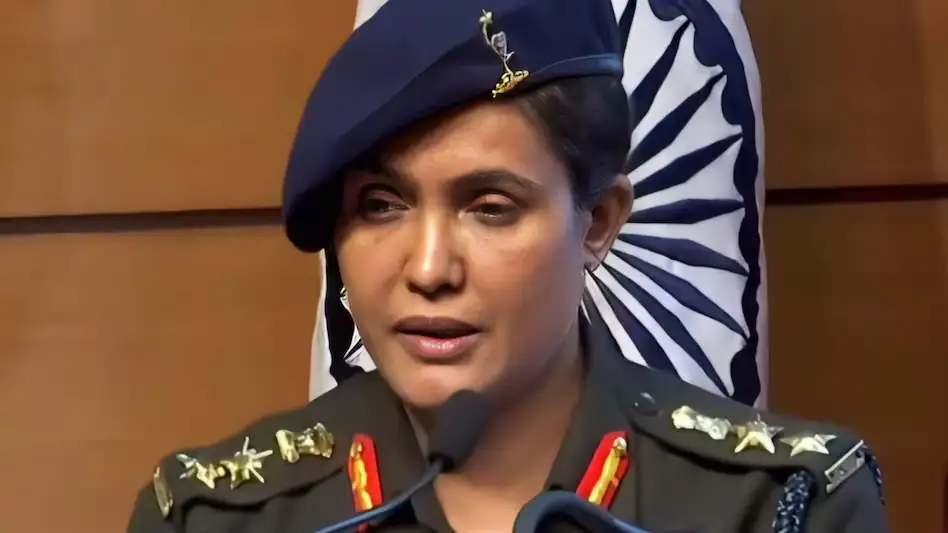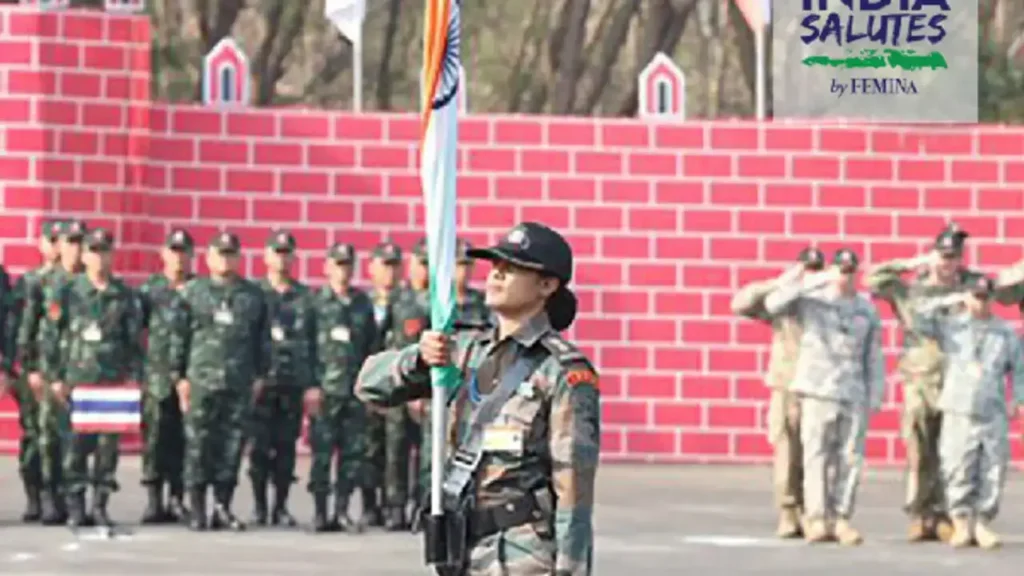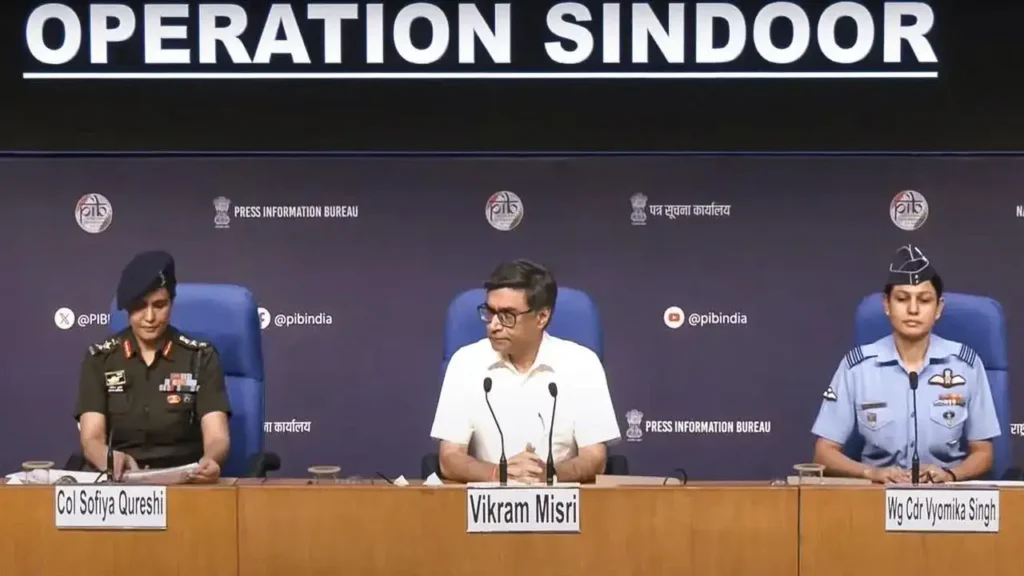Col Sophia Qureshi: A Groundbreaking Leader and the Operation Sindoor Briefing

Col Sophia Qureshi made history as the first woman officer to lead an Indian Army contingent during a multinational military exercise. This remarkable achievement highlights the growing role of women in top military leadership positions and their increasing participation in complex, high-level operations. Recently, she delivered a crucial briefing on the strategically significant Operation Sindoor, showcasing not only her leadership but also her tactical insight.
A Trailblazer in the Indian Army

Col Qureshi comes from a military family, and her decision to join the Indian Army stemmed from a strong sense of purpose, discipline, and an unwavering commitment to serve the nation. Her rise through the ranks reflects a broader shift toward greater inclusion of women in defense, alongside her personal achievement. Throughout her distinguished career, Col Qureshi has earned the respect of her peers and commanders due to her exceptional strategic acumen and dedication to the Army’s mission.
Before taking command during the multinational exercise, Col Qureshi built an impressive record across various operational roles. She demonstrated proficiency in both tactical and leadership capacities, positioning herself for this pivotal moment in her career. As a result, her contributions helped shape her reputation as one of the foremost leaders in her field. Furthermore, her extensive experience ensured that she was more than prepared for the challenges of leading an international contingent.
Understanding Operation Sindoor

Operation Sindoor is a multi-dimensional military operation designed to test and showcase India’s readiness to address a wide array of national security challenges. This large-scale operation involves coordination between several military forces—both Indian and international—and aims to evaluate combat effectiveness, logistical capability, and strategic planning. Therefore, the operation is vital for strengthening India’s defense posture and demonstrating its military capabilities on the global stage.
As the leader of the Indian Army’s contingent, Col Qureshi played an integral role in briefing her team for this operation. She articulated the operational objectives, timelines, and strategic goals to ensure smooth execution. Her extensive military knowledge and ability to manage complex tasks proved crucial in ensuring that all participants understood the mission’s requirements. Ultimately, this clarity and focus allowed for a seamless execution of the mission.
Shattering Stereotypes in Military Leadership
Col Qureshi’s leadership exemplifies the evolving role of women in the Indian Armed Forces. Historically, women in the military have faced numerous challenges, particularly when it comes to accessing high-ranking positions or receiving recognition for their contributions. However, Col Qureshi’s rise to such a significant leadership role challenges those barriers and highlights the growing emphasis on gender inclusivity in the military. Moreover, her achievements pave the way for future generations of women to pursue leadership roles within defense.
By leading a multinational contingent, Col Qureshi’s success marks an important milestone in challenging stereotypes about women in the armed forces. Her achievements not only demonstrate her capabilities but also signal a broader cultural shift within India’s military, where women increasingly take on leadership roles in both operational and combat scenarios. In fact, her success is now seen as an inspiration for countless women seeking to break barriers in male-dominated fields.
The Importance of Her Command
Successfully leading a multinational military exercise requires a combination of diplomatic, logistical, and operational skills. Col Qureshi’s command tested her leadership abilities, requiring her to coordinate between diverse military units and ensure that all teams met the mission’s objectives. Her ability to manage such a multifaceted operation further underscores her competence as a military leader. In addition, her strategic foresight played a key role in the success of the operation, ensuring that all contingents worked together effectively.
Multinational exercises play a crucial role in enhancing defense cooperation, improving interoperability between armed forces, and strengthening strategic alliances. Under Col Qureshi’s leadership, the Indian contingent demonstrated its readiness to collaborate on the global stage and participate in complex defense operations alongside international forces. Therefore, her leadership not only showcased India’s military prowess but also reinforced the importance of global defense cooperation.
A Source of Inspiration for Women in Defense
Col Qureshi’s role in Operation Sindoor is more than just a professional achievement—it serves as a source of inspiration for aspiring young women considering a military career. As the first woman to take command in such a high-profile exercise, she has become a role model, proving that gender does not define leadership potential in the armed forces. Her success speaks to the growing opportunities for women in defense and underscores the importance of perseverance and skill in overcoming challenges.
Furthermore, her accomplishment highlights the importance of empowering women to take on leadership roles in defense. By breaking barriers and taking on significant responsibilities, Col Qureshi encourages other women to pursue their ambitions in fields where they have historically been underrepresented. Her leadership exemplifies the strength and resilience of women in the military, encouraging a future where female officers continue to rise to the highest levels of command.
A Glimpse into the Future of Women in the Indian Army
Col Qureshi’s success is part of a larger movement within the Indian Armed Forces to increase the representation of women in key military roles. Over the years, more women have joined various arms of the military, with increasing opportunities for advancement in both leadership and combat positions. Col Qureshi’s pioneering leadership in a multinational exercise reinforces the importance of continuing this progress. As such, her success is both a symbol and a catalyst for the change that is gradually taking place.
As the Indian Army modernizes and adapts to evolving challenges, the role of women in shaping its future becomes more apparent. Future reforms aimed at increasing gender equality will likely open doors for more women to take on critical operational and leadership roles. Undoubtedly, Col Qureshi’s legacy will play a significant part in these ongoing efforts, and her example will continue to inspire future generations.
Conclusion
Col Sophia Qureshi’s historic achievement of leading a multinational military contingent and briefing on Operation Sindoor underscores her exceptional leadership and strategic foresight. Her story serves as a testament to the increasing role of women in military leadership, and her contributions are shaping the future of the Indian Army. Col Qureshi has set a remarkable precedent for future generations, showing that leadership is defined by skill, dedication, and vision—qualities that transcend gender. As the Indian Army continues to evolve, leaders like Col Qureshi will pave the way for future women leaders, ensuring that the armed forces remain strong, inclusive, and forward-thinking.






